News release, October 1, 1998. The 1999 fiscal budget presented to the Althing.
Iceland's Treasury finances have been substantially strengthened in recent years. The budget was in persistent deficit from the middle of the last decade with concomitant borrowing and accumulation of debt. The Government has gradually been able to improve Treasury finances through various political measures. These measures have led to an improvement in Treasury finances with the result that Treasury debt will be reduced by up to 30 billion krónur in 1998 and 1999.
A stronger revenue balance. The Government has set a goal of using the upswing in the economy to repay Treasury debt, thereby reducing interest cost and the debt passed on to future generations. This is the main characteristic of the 1999 budget. The revenue surplus is estimated at 2 billion krónur, an improvement of about 5 billion over the estimate for 1998.
Gross Treasury debt
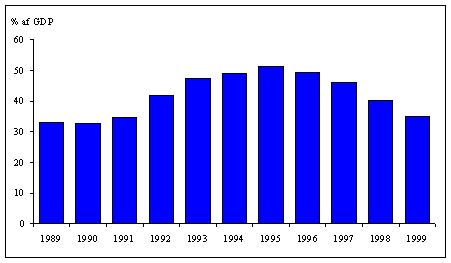
Debt is being repaid. The net financial surplus is expected to amount to 15 billion krónur in 1999, an amount similar to this year's. This means that the debt of the Treasury will be 22 billion krónur lower at the end of 1999 than two years earlier. The debt-to-GDP ratio will have fallen from 46% at the end of 1997 to 34% at the end of 1999. This reduction in debt will lower the Treasury's annual interest cost by about 1.2 billion krónur. The finances of the Treasury will thus do much to mitigate the negative effects of the current account deficit on the economy and contribute towards continued stability in the Icelandic economy.
Net financial balance of the Treasury
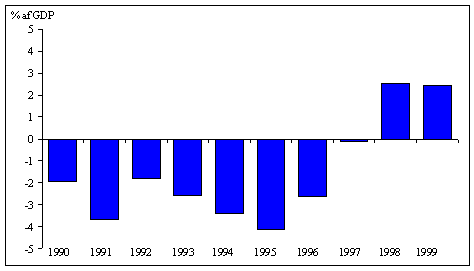
Reduction of foreign debt. Emphasis is being placed on the repayment of foreign debt. No new foreign debt has been created this year, whereas two loans, totaling 10 billion krónur, are being repaid. In addition, the Treasury's short-term foreign debt has been reduced. All told, it is expected that outstanding foreign debt of the Treasury will decline by about 15 billion krónur in 1998.
Accumulation of debt by government enterprises and funds has been stopped. The 1999 budget projects that total new central government borrowing (i.e., that of the Treasury, government enterprises and government-owned funds) will nearly all go towards the refinancing of existing debt. This means that central government debt will remain broadly unchanged in 1999 as in 1998. This represents a major change from past practice when the central government is no longer a net borrower in the financial market. As late as in 1991 the central government borrowed the equivalent of 10% of GDP, or 60 billion krónur at current prices. The impact of this change is that room has been created for private enterprises and households in the credit market and the pressure on interest rates has been eased.
The economic expansion increases revenue. The continued economic expansion helps to increase Treasury revenue which is expected to reach 181 billion krónur in 1999, 6 billion more than estimated for this year. Of this amount, 2.7 billion is attributable to taxes on expenditure and 2.1 billion to the personal income tax despite a 1% reduction in the tax rate as of the beginning of next year at a cost of 1.5 billion. Social security taxes will yield about half a billion krónur in increased revenue. Total revenue of the Treasury in relation to GDP is expected to decline from 27.3% in 1998 to 26.4% in 1999.
Development of revenue and expenditure
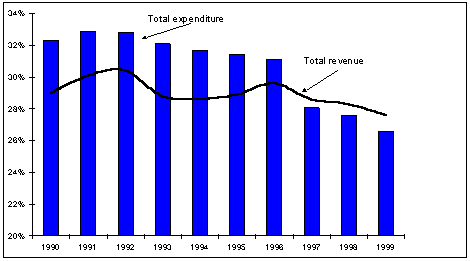
Considerable sales of assets planned. For the second year in succession the Government intends to privatise government assets. About half of the shares in the Iceland Investment Bank and Iceland Prime Contractors will be sold this year and the other half will be sold next year. One-fourth of the shares in the Iceland Cement Works Inc. will also be sold next year. It remains uncertain how much revenue these sales will yield. Only the actual profit above book value will be treated as revenue, estimated at 2.4 billion. The actual sales will return far more proceeds to the Treasury; the sale of the book value portion will be entered as a financial transaction and go towards the reduction of debt.
Lower personal income taxes. The Government has reduced the personal income tax rate by 4 percentage points, from 30.4% in 1996 to 26.4% in 1999. The first stage of the reduction, 1.1%, was implemented in 1997. The rate was reduced by a further 1.9% at the beginning of 1998 and a still further reduction of 1% will take place at the beginning of next year. These steps are important in reducing the marginal income tax for individuals which in turn will be mirrored in improved disposable household incomes.
Expenditure increases less than the growth in GDP. Total expenditure is estimated at 179.3 billion krónur in the 1999 budget on an accruals basis, increasing by 2 billion over the estimate for this year and by 13.5 billion over the fiscal budget figure. Excluding pension fund liabilities, the increase amounts to 6 billion or 3.5% between the two years. By comparison, GDP is expected to rise by 5% in volume terms and by 7.5% in nominal terms. The share of Treasury expenditure in GDP will thus decline by 1% from 1998 to 1999. The improvement in Treasury finance, however, provides an opportunity to increase appropriations to several important expenditure categories, particularly health, education, culture and communications without easing the fiscal policy stance.
Personal income tax rates
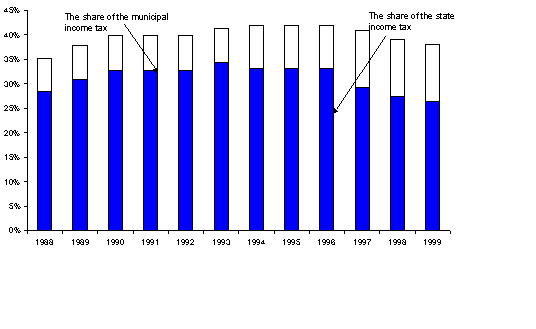
Growing domestic demand. Although the fiscal budget includes many improvements and increased expenditures for several priority categories, fiscal policy is nevertheless restrictive. There are several signs that such a restrictive stance is necessary, since the growth in domestic demand has become quite substantial. Imports of consumer durables have increased sharply, particularly of automobiles and household appliances. The trade balance has deteriorated at the same time as unemployment has declined. Bank credit has expanded well beyond the level of a year ago. All of these factors point towards growing economic activity that must be carefully watched in the near future.
A continued restrictive fiscal policy. In these circumstances it is seen as necessary that the Government continues its countermeasures against demand expansion so as to preserve price stability. Measures of restriction are called for both in monetary and fiscal policy. The room for a stricter monetary policy is, however, limited since it is quite restrictive already which is reflected in a considerably higher interest rate in Iceland than in most neighbouring countries. Furthermore, the króna exchange rate has appreciated in the past two years, which has weakened the competitiveness of Icelandic industry. A continued tight fiscal policy contributes towards increased domestic saving and restricts the expansion in domestic demand. This will not mean that expenditure on important priority categories, such as health, welfare and education, must be cut back. Expenditure on these categories will increase next year at a similar pace as in previous years. Expenditure on general government administration will be treated with frugality; outsourcing of government tasks through tenders will be continued. Privatization of government assets will also increase private sector saving and counter the expansion in demand. The same goes for the pension reform, which is designed to increase pension savings.
Treasury finances
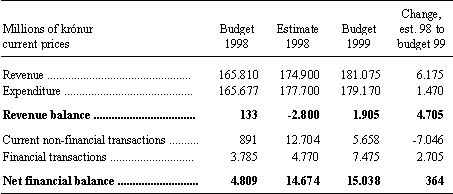
Measures to encourage saving. The Minister of Finance appointed a committee earlier this autumn to propose measures to raise the level of saving in the economy. The committee will turn in its report soon, whereupon its proposals will be submitted to the Cabinet. Opinion is divided on tax incentives designed to increase a particular form of saving, since such measures merely lead to the transfer of savings from one form to another. Such measures can nevertheless be justified temporarily in light of other goals such as encouraging the stock market.
Municipalities must contribute their share. It is important that the finances of the municipalities be adequate. In present circumstances this means that they must turn in a surplus on their operations, thus contributing to economic stability. The municipalities have enjoyed their share of improved prosperity in concert with rising household purchasing power. Following the takeover by municipalities of several tasks from the central government, they are now in charge of about a quarter of the public sector. It is therefore more important than before that the municipalities be in alignment with economic circumstances at each time. Under present conditions they must turn in a surplus in order to contribute to continued stability.
Government measures yield results. The measures of the Government to improve economic conditions have yielded impressive results. In order to strengthen the competitiveness of industry, taxes on enterprises have been reduced and other measures have been implemented. As a result the confidence of foreign investors in the Icelandic economy has been strengthened which is reflected in an improved rating for Icelandic sovereign debt in international markets. The Icelandic authorities have also received very positive statements on their economic policy from the OECD and the IMF, due to their measures to improve the financial market and government operations by increasing the emphasis on operational efficiency, marketization and pension reform, among other areas.
Reduction of public debt. Public debt in relation to GDP has been declining. It amounted to 53% of GDP in 1997, down from 59% in 1995. It is estimated to be reduced to 47% in 1998 which is nearly all due to the reduction in Treasury debt due to the net financial surplus this year. Next year the public debt ratio will decline still further, to 41%, having thus declined by one-third over ther period 1995-1999. Icelandic public debt is low in comparison with OECD countries, where public debt averages 70% of GDP and in EU countries the average is 75%. In individual countries, such as in Belgium and Italy, the debt ratio is still higher, about 120% of GDP. The debt of the Treasury is also being reduced considerably faster in Iceland than in most other countries.
Gross public debt (in per cent of GDP)
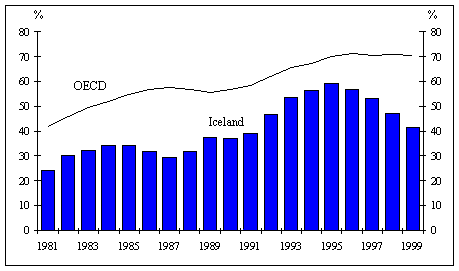
Preparing for the future. The policy of the Government, as it is reflected in the 1999 fiscal budget, is to foster economic stability, encourage further growth and improve living standards. A key feature is to use the economic expansion to improve Treasury finances and continue the reduction in Treasury debt. This is a fiscal policy priority and one of the most important tasks of economic policy. This prepares us for the future and strengthens economic growth. That is the principal aim of the fiscal budget.
The Ministry of Finance, October 1, 1998
